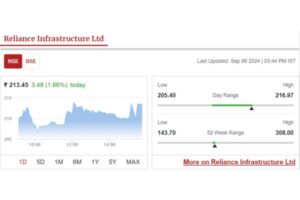India’s Reliance Infrastructure is viewing projects to produce electric cars and batteries, and has recruited a last India executive at China’s BYD Co to suggest on its projects, two origins versed on the matter told Reuters.
According to the first source, the company, which is a part of Anil Ambani’s Reliance Group, has recruited outside consultants to carry out a ‘cost feasibility’ assessment for the establishment of an EV facility with an initial capacity of roughly 250,000 vehicles annually, with plans to scale that up to 750,000 over a few years.
According to the source, it is also examining the viability of constructing a battery plant with a capacity of 10 gigawatt hours (GWh) and increasing it to 75 GWh over a ten-year period.

Regarding its plans, which are being revealed publicly for the first time, Reliance Infrastructure did not reply to a request for comment. The company’s shares closed over 2% higher after the Reuters report was released, having previously dropped 0.2%.
A request for comment from Sanjay Gopalakrishnan, a former executive of BYD who has joined as a consultant to advise on the EV project, was not answered.
Anil Ambani is the younger brother of Mukesh Ambani, the richest person in Asia and the head of Reliance Industries, which specializes in retail, telecom, and oil and gas. In 2005, the brothers divided the family company.
In addition to striving to produce batteries locally, Mukesh’s company last week won a competition to be eligible for government incentives for producing 10 GWh of battery cells.
In a sector where electric vehicles (EVs) are still a niche product but are expanding quickly, the brothers will compete directly if Anil’s firm chooses to move forward with its plans.
Less than 2% of the 4.2 million vehicles sold in India last year were electric versions, but the government hopes to increase this to 30% by 2030. It has allocated more than $5 billion in incentives for companies that produce EVs and related parts, such as batteries, locally.
India’s battery industry is still in its beginnings, but a few domestic producers, such as Exide and Amara Raja, have partnered with Chinese companies to share knowledge so that India may produce lithium-ion battery cells.
According to the first source, Reliance Infrastructure is seeking partners, including Chinese companies, and hopes to complete its plans in the next months.
With a roughly 70% market share, Tata Motors is the biggest electric vehicle (EV) player in India; rivals like BYD and MG Motor, a division of SAIC, are catching up. Leaders in the overall vehicle sector Maruti Suzuki and Hyundai Motor want to introduce EVs by 2025.
After more than two years, leading and founding BYD’s electric passenger vehicle business in India, introducing three EVs, and building a dealership network, Gopalakrishnan retired from BYD this year.
According to government documents that Reuters examined, Reliance Infrastructure established two new wholly-owned corporations with a focus on vehicles in June.
‘To manufacture, deal, in vehicles of every description and components for transport and conveyance using any nature of fuel’ is the ‘main objective’ of Reliance EV Private Ltd.
Reliance Infrastructure has experienced financial flow problems and excessive debt levels recently. How the EV project will be financed remains unknown.







